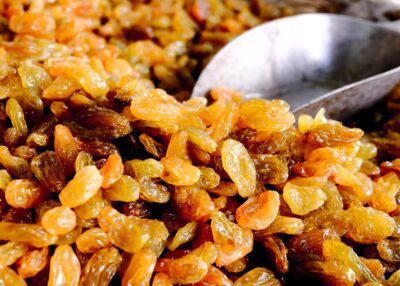7 Best IRON RICH DRIED FRUITS AND NUTS

- Raisins
- Prunes
- Apricots
- Dates
- Figs
- Almonds
- Walnuts
Why Is Iron An Important Part Of Your Diet?
Iron is an important part of a healthy diet as it plays a crucial role in carrying oxygen from the lungs to the rest of the body. It also helps the body produce red blood cells, which carry oxygen to the cells, and helps with energy metabolism. A lack of iron can lead to iron-deficiency anemia, a condition characterized by fatigue, weakness, and a decreased ability to concentrate.
Are Dried Fruits And Nuts A Good Source Of Iron?
Yes, dried fruits and nuts can be a good source of iron. Some dried fruits, such as raisins, prunes, apricots, dates, and figs, are high in iron. Nuts, such as almonds and pistachios, also contain iron. However, it’s important to note that the amount of iron in these foods can vary and they may not be the most absorbable form of iron, so it’s best to consult with a healthcare provider to determine the best sources of iron for your individual needs.
Raisins
Raisins are a type of dried fruit that are a good source of iron. One serving of raisins (about 1/4 cup) contains approximately 0.7 mg of iron. However, it’s important to note that the iron content of dried fruits can vary depending on factors such as the drying method and storage conditions. It’s best to consult with a healthcare provider to determine the best sources of iron for your individual needs.

Prunes
Prunes are a type of dried fruit that are a good source of iron. One serving of prunes (about 4-5 dried prunes) contains approximately 1 mg of iron. However, it’s important to note that the iron content of dried fruits can vary depending on factors such as the drying method and storage conditions. It’s best to consult with a healthcare provider to determine the best sources of iron for your individual needs.
Apricots
Apricots are a type of dried fruit that is a good source of iron. One serving of apricots (about 5-6 dried apricots) contains approximately 1 mg of iron. However, it’s important to note that the iron content of dried fruits can vary depending on factors such as the drying method and storage conditions. It’s best to consult with a healthcare provider to determine the best sources of iron for your individual needs.
Dates
Dates are a type of dried fruit that are a good source of iron. One serving of dates (about 4-5 medium-sized dates) contains approximately 0.7 mg of iron. However, it’s important to note that the iron content of dried fruits can vary depending on factors such as the drying method and storage conditions. It’s best to consult with a healthcare provider to determine the best sources of iron for your individual needs.
Figs
figs are a good source of iron. One fresh fig contains about 0.5 milligrams of iron, which is about 6% of the daily recommended intake for adult women. Dried figs are even more concentrated, with one dried fig containing about 1 milligram of iron, or about 12% of the daily recommended intake. Eating figs, especially in combination with other iron-rich foods, can help maintain adequate iron levels in the body, which is important for maintaining healthy red blood cells and preventing anemia.
Almonds
Almonds are a type of nut that are also a source of iron. One ounce (28 grams) of almonds contains approximately 1.1 mg of iron. However, it’s important to note that the iron content of nuts can vary depending on factors such as processing and storage conditions. It’s best to consult with a healthcare provider to determine the best sources of iron for your individual needs.
Walnuts
Walnuts are a type of nut that are also a source of iron. One ounce (28 grams) of walnuts contains approximately 0.9 mg of iron. However, it’s important to note that the iron content of nuts can vary depending on factors such as processing and storage conditions. It’s best to consult with a healthcare provider to determine the best sources of iron for your individual needs.
Adding Dried Fruits And Nuts To Your Diet
Adding dried fruits and nuts to your diet can be a simple and convenient way to increase your iron intake. Here are a few ways to incorporate these foods into your diet:
- Snacks: Keep a small container of dried fruits and nuts in your purse or desk at work for a quick and easy snack.
- Salads: Add chopped dried fruits and nuts to your favorite salad for extra flavor and nutrition.
- Yogurt parfait: Layer yogurt, granola, and dried fruits for a nutritious and delicious breakfast or snack.
- Trail mix: Mix together a variety of dried fruits and nuts for a portable and energy-packed snack.
- Baked goods: Add chopped dried fruits and nuts to your favorite baked goods such as muffins, breads, and bars for added flavor and nutrition.
It’s important to keep in mind that dried fruits and nuts are calorie-dense, so it’s important to eat them in moderation as part of a balanced diet.
Disclaimer
Please note that adding dried fruits and nuts to your diet should be done in moderation as part of a balanced diet, as they are calorie-dense foods. It’s also important to keep in mind that individual nutritional needs vary and it’s best to consult with a healthcare provider to determine the best dietary plan for your individual needs.
